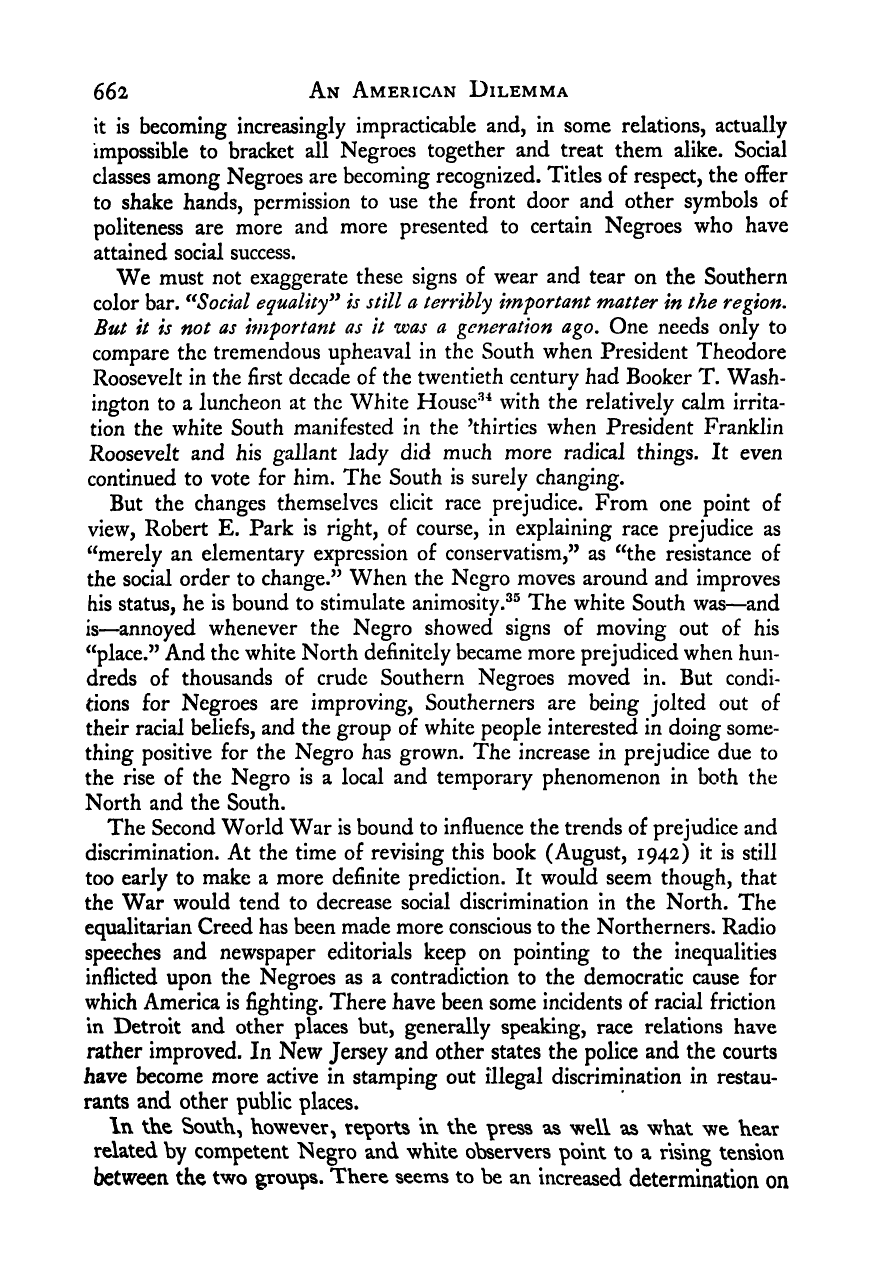Note: Gunnar Myrdal died in 1987, less than 70 years ago. Therefore, this work is protected by copyright, restricting your legal rights to reproduce it. However, you are welcome to view it on screen, as you do now. Read more about copyright.
Full resolution (TIFF) - On this page / på denna sida - VII. Social Inequality - 30. Effects of Social Inequality - 5. Present Dynamics

<< prev. page << föreg. sida << >> nästa sida >> next page >>
Below is the raw OCR text
from the above scanned image.
Do you see an error? Proofread the page now!
Här nedan syns maskintolkade texten från faksimilbilden ovan.
Ser du något fel? Korrekturläs sidan nu!
This page has never been proofread. / Denna sida har aldrig korrekturlästs.
662 An American Dilemma
it is becoming increasingly impracticable and, in some relations, actually
impossible to bracket all Negroes together and treat them alike. Social
classes among Negroes are becoming recognized. Titles of respect, the offer
to shake hands, permission to use the front door and other symbols of
politeness are more and more presented to certain Negroes who have
attained social success.
We must not exaggerate these signs of wear and tear on the Southern
color bar. ^^Social equality^^ is still a terribly important matter in the region.
But it is not as important as it was a generation ago. One needs only to
compare the tremendous upheaval in the South when President Theodore
Roosevelt in the first decade of the twentieth century had Booker T. Wash-
ington to a luncheon at the White House"^^ with the relatively calm irrita-
tion the white South manifested in the ’thirties when President Franklin
Roosevelt and his gallant lady did much more radical things. It even
continued to vote for him. The South is surely changing.
But the changes themselves elicit race prejudice. From one point of
view, Robert E. Park is right, of course, in explaining race prejudice as
“merely an elementary expression of conservatism,” as “the resistance of
the social order to change.” When the Negro moves around and improves
his status, he is bound to stimulate animosity.^^ The white South was—and
is—annoyed whenever the Negro showed signs of moving out of his
“place.” And the white North definitely became more prejudiced when hun-
dreds of thousands of crude Southern Negroes moved in. But condi-
tions for Negroes are improving. Southerners are being jolted out of
their racial beliefs, and the group of white people interested in doing some-
thing positive for the Negro has grown. The increase in prejudice due to
the rise of the Negro is a local and temporary phenomenon in both the
North and the South.
The Second World War is bound to influence the trends of prejudice and
discrimination. At the time of revising this book (August, 1942) it is still
too early to make a more definite prediction. It would seem though, that
the War would tend to decrease social discrimination in the North. The
equalitarian Creed has been made more conscious to the Northerners. Radio
speeches and newspaper editorials keep on pointing to the inequalities
inflicted upon the Negroes as a contradiction to the democratic cause for
which America is fighting. There have been some incidents of racial friction
in Detroit and other places but, generally speaking, race relations have
rather improved. In New Jersey and other states the police and the courts
have become more active in stamping out illegal discrimination In restau-
rants and other public places.
In Ihe Sontlv, however, reports m the press as weW as what we hear
related by competent Negro and white observers point to a rising tension
between the two groups. There seems to be an increased determination on
<< prev. page << föreg. sida << >> nästa sida >> next page >>